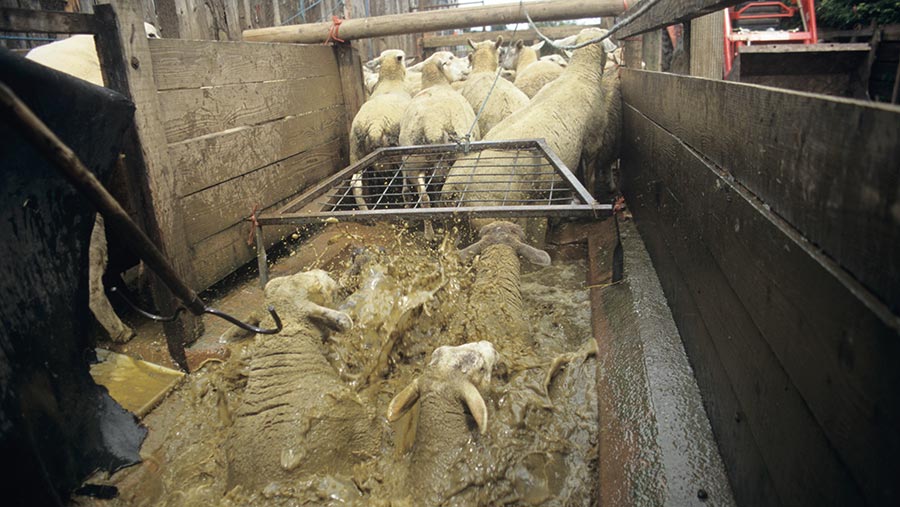Farmers warned over ‘cowboy’ sheep dip contractors
 © Science Photo Library
© Science Photo Library Farmers shopping around for sheep dipping services should be wary of “cowboy” contractors flouting human, animal and environmental health rules.
The warning follows two recent cases of malpractice submitted to the Veterinary Medicines Directorate (VMD). It is believed the contractors will be sent cautionary letters.
Illegal practices from rogue sheep dippers include using organophosphate (OP) dip through showers and jet washers, and emptying dip tub content onto farmyards, Farmers Weekly can reveal.
See also: Sheep farmer sees four clear benefits of plunge-dipping
Independent sheep consultant Lesley Stubbings said the warnings were a “shot across the bows” intended to get rule breakers on the right side of the law.
“Farmers shouldn’t have to worry [when getting a professional in] about getting the job done,” said Ms Stubbings. “If you’re paying for a professional, you should have peace of mind the job is done right.”
“Ultimately, these cowboys can only operate if people are prepared to pay them for a poor job, and an example needs making of a small number of dippers breaking the law.”
Is the price right?
Contract sheep dipper Neil Fell, of NR Fell Mobile Sheep Dipping, said alarm bells should start ringing if people are charging less than £1 a head for a few hundred sheep.
He said the cost of dip solution had not escaped price inflation and had risen about 15% in recent months.
Using dip solution properly at the recommended concentration and emptying and replenishing the dip tub meant a cost of about 20-30p a ewe, and that was before the cost of disposal, he said.
Mr Fell said he had heard reports of sheep dippers charging 50-60p a ewe, which “did not stack up” if people were doing a thorough and genuine job.
If sheep are not being dipped for long enough in properly mixed dip it will lead to parasite resistance, Ms Stubbings said, just as sub-optimal treatments have led to resistance in antibiotics and wormers.
Comprehensive best practice guidelines on sheep dipping (PDF) were published in the summer and are available from Sustainable Control of Parasites in Sheep (Scops).
Farmers are being reminded that using responsible contractors for plunge dipping is a great way to control five key ecto-parasites, in a safe way, and can be used on incoming stock for biosecurity against sheep scab, which remains a major problem in the UK.
Cost of disposal for farmers disposing of dip on their own land
- Scotland A permit can be obtained for £674, with an annual subsistence charge of £90
- England A new application costs £2,708, with an annual subsistence charge of £273
- Wales Volumes dictate cost, but most farms will be classed as “small” and will cost £700, with an annual subsistence charge of £300
- Note that sheep scab is a notifiable disease in Northern Ireland and Scotland
- You should consult with environmental agencies to determine the best approach for spreading
- Many dippers are licensed to remove and dispose of dip responsibly
Questions to ask
Ms Stubbings said a few simple questions asked on the phone or when the dipper arrived could flag up a rogue trader.
OP dip must be prescribed to farms with a dip licence, and to do this an idea of sheep numbers is required to prescribe an appropriate amount.
Before arriving to dip the sheep, a compliant contractor might ask you:
- Where is the dipping going to be done? Is it 10m away from watercourses, for example?
- How many sheep will be dipped? This number is needed to calculate the amount of dip solution required, so the supplier can prescribe it to the sheep dipper.
You could ask the dipping contractor:
- How long will it take? If the response sounds like a brag, this might be a sign that they are cutting corners.
- Do you have a licence to buy dip? Anyone buying dip must have it prescribed by a suitably qualified person and hold a Certificate of Competence NPTC Level 2 Award in the Safe Use of Sheep Dip. Farmers should protect themselves by getting the contractor to sign their name to an agreement stating the contractor’s responsibility for disposing of the dip solution.
- Do you have a licence to dispose of dip? They must have an Environment Agency (EA) licence or a Waste Carrier licence to dispose of dip. A registered waste carrier company can remove and take the dip to a treatment facility. Or the contractor can remove it using a Waste Carrier licence and store it in tanks designated to be suitable by the EA for disposal by a waste contractor.
